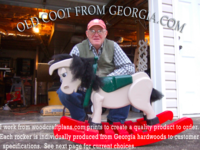"Up" captures essence of fatherhood with Carl, Russell's unique bond

Ironically, his illness came at a time when he'd found a renewed zest for life, right after retirement. All his life Dad worked hard to take care of his family, including an adoring wife and four daughters who love nothing better than to make him laugh. After he retired, I realized what a burden this must have been. Suddenly he had all kinds of time for the things he most loves to do: Habitat for Humanity builds, traveling with my mother, and a new love interest: building rocking horses through his business "Old Coot from Georgia."
As I watch my husband, Craig, interact with our kids, it's obvious that his parenting style differs significantly from my father's, which isn't a bad thing. I just admire him for different reasons.
For example, Craig was nearly 50 when we decided to foster-adopt a sibling group. At a time when many men look forward to the peace and quiet of an empty nest, Craig courageously made room in his life for three little kids: a 5-year-old, a 3-year-old, and an infant. The older two would barely look at him in the beginning, so he tended to little Sarah. Their special connection continues to this day.
That's not to say ours is an idyllic existence. Because of his long work hours, Craig is seldom home for family dinners or extended projects. He is older than my father was when we were my children's age — longer on patience, but significantly shorter on energy. And so, perhaps not surprisingly, the kids tend to cling to me. "Next to you, I'm chopped liver," he says. It isn't true, of course, though it's hard to convince him when the kids fight over who sits next to me at dinner.
Our family dynamic is what it is. In this economy, people are working harder and demanding less. So, like many families, we make the most of the time we have together, rather than wasting time wishing for the impossible.
One way I encourage my kids to appreciate their family — and their father in particular — is to talk with them about fathers they see in films and on television. For us, images of adoptive parenthood are especially helpful because they affirm the fact that "family" is not always about biology; "parent" is as much a verb as a noun.
For example, I was deeply moved by the irascible Carl in Pixar's movie "Up." Grieving over the loss of his beloved Ellie, Carl strives to carry out her wishes as best he can, in her memory. What he doesn't count on is a little stowaway named Russell — a boy with a deep need for a father figure, someone who can show him how to be a man.
Why Carl and Ellie had no children of their own is not fully explained. Together they dreamed of babies, and even decorated the nursery. And yet, for many reproductively challenged couples, the why is never fully explained - and even when it is, is seldom satisfying.
Faced with the devastating loss of his wife, and the prospect of losing even the home that contains his memories, Carl shuts the world out, until young Russell comes knocking, then stows away on the floating home. As the adventure progresses Carl recognizes in the boy a kindred spirit. And in their quest - an adventure marked with great personal self-sacrifice, which is the essence of true fatherhood - the pair formed an extraordinary bond.
Why do I find this movie such a compelling argument for fostering and adoption? Carl does not formally adopt Russell, whose father's absence is also never fully explained. However, in reaching out to the boy, a most remarkable transformation occurs in the man.
Just as many women have an built-in need to nurture (which each of us expresses a bit differently), the surest pathway to happiness for men (as is shown by the Charles Muntz character in the movie) is being in relationship with other people, and in a particular way with the next generation - whether or not they share a biological connection.
In my blog for adoptive, foster, and special-needs parents, the Extraordinary Moms Network, I frequently write about our God-given yearning to nurture and protect human life, regardless of whether we become biological parents. In this movie, I saw a poignant image of Extraordinary Fatherhood - a bond very different from a mother's, but no less important.
What are your favorite images of fatherhood in the media?
Heidi Hess Saxton is a contributor to the Parenting Channel of AnnArbor.com, and the founder of the "Extraordinary Moms Network." You can write to her at heidi.hess.saxton@gmail.com.

